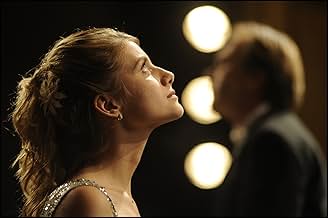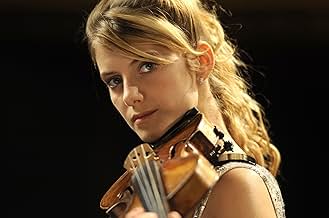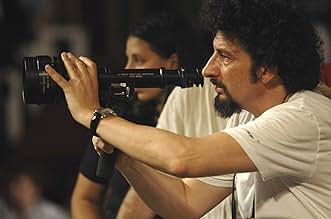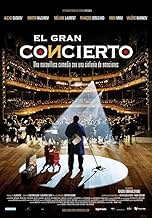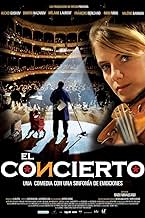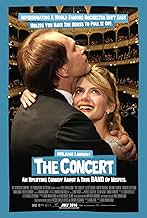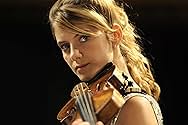Le concert
- 2009
- Tous publics
- 1h 59min
NOTE IMDb
7,5/10
19 k
MA NOTE
Dans cette comédie dramatique, un maestro déchu saisit l'opportunité de réunir son orchestre 30 ans après avoir été forcé à céder sa place pour des raisons politiques.Dans cette comédie dramatique, un maestro déchu saisit l'opportunité de réunir son orchestre 30 ans après avoir été forcé à céder sa place pour des raisons politiques.Dans cette comédie dramatique, un maestro déchu saisit l'opportunité de réunir son orchestre 30 ans après avoir été forcé à céder sa place pour des raisons politiques.
- Réalisation
- Scénario
- Casting principal
- Récompenses
- 9 victoires et 16 nominations au total
Dmitriy Nazarov
- Aleksandr 'Sasha' Abramovich Grosman
- (as Dimitri Nazarov)
Miou-Miou
- Guylène de La Rivière
- (as Miou Miou)
Valeriy Barinov
- Ivan Gavrilov
- (as Valeri Barinov)
Anna Kamenkova
- Irina Filipova
- (as Anna Kamenkova Pavlova)
Anghel Gheorghe
- Vassili
- (as Anghel Gheorghe dit 'Caliu Din Clejani')
Aleksandr Komissarov
- Viktor Vikich
- (as Alexander Komissarov)
Guillaume Gallienne
- Laudeyrac
- (as Guillaume Gallienne de la Comédie Française)
Avis à la une
This is a gem of a movie. Do not miss it! Amazing rarely seen Russian actors, hilarious comedy, emotions by the bucket, tears, sublime music, tension, suspense, it's been a while since I saw anything like it. I was weary that the director, prize winner of art-house fame, would make a slow pompous contemplative film. At the contrary Le Concert is a fast moving beautifully shot comedy about music, artists, Russia, Paris and communism. The director makes the actors brilliant, even average French actors like Miou Miou or the young soloist whose name I forgot. Do not wait for the DVD: it's worth watching on a big screen with a loud digital surround to enjoy the violins and the magnificent soundtrack. Bring your tissues you will laugh and cry, a great night out guaranteed!!!
This movie goes a long way to heal my nostalgia for the good films of old. A lot of the "modern" eastern European movies try very hard to be so soul searching, so psycho-dramatic, as if they are on a mission to turn and twist their bewildered audience in the hope of some intellectual and metaphysical gratification (or maybe just the hope of a Palme D'Or). Radu Mihaileanu is the master of story telling, touching souls in the best way possible, really. Yes you can pick faults, like with most movies, but if you really pay attention and let you and your feelings move with the flow of the movie, you will be in for a great soul experience. The inaccuracies, the factual errors won't matter anymore. What it does matter is that the author is pretty much exact in retrieving the atmosphere of an era which some of us actually experienced.
I received warm recommendations before going to see "Le concert" and, as a consequence, was prepared to like it.
I must admit that hearing one of my favourite classical pieces at the beginning induced a positive outlook; however, as I am rather critical, this would not have made up for a boring experience afterwards.
Yet the rest was delightful, and there was no moment left for fatigue or dissatisfaction. Those clichés criticized by some are still well understood in Eastern Europe; as to the exacerbated kitsch - it can be found today, with no difficulty, within the society I live in.
The plot may have seemed straightforward, but a whirlwind of colour, wonderful music, sadness and humour carried me swiftly to the end and to the applause of the audience in the cinema.
It may not be the best film I have seen, but it certainly possesses the "je ne sais quoi" that makes you want to see it again, that makes you feel different for having experienced it. And for this, I think "Le Concert" should be accepted and loved just as it is.
I must admit that hearing one of my favourite classical pieces at the beginning induced a positive outlook; however, as I am rather critical, this would not have made up for a boring experience afterwards.
Yet the rest was delightful, and there was no moment left for fatigue or dissatisfaction. Those clichés criticized by some are still well understood in Eastern Europe; as to the exacerbated kitsch - it can be found today, with no difficulty, within the society I live in.
The plot may have seemed straightforward, but a whirlwind of colour, wonderful music, sadness and humour carried me swiftly to the end and to the applause of the audience in the cinema.
It may not be the best film I have seen, but it certainly possesses the "je ne sais quoi" that makes you want to see it again, that makes you feel different for having experienced it. And for this, I think "Le Concert" should be accepted and loved just as it is.
This is the first film of Radu Mihaileanu that really did it to me. It is moving, I resonated with the subject, I laughed when it was funny and I was close to tears when it meant to be emotional. Yet, as his previous films, it is not a masterpiece just a good film to remember. Which is no small matter either.
Mihaileanu's previous films were each of them based on original and different ideas. in each of those the ideas hold above the execution. 'Train de vie' was one of the first films to deal with Holocaust from a comic perspective, and maybe the most interesting idea of all, better even as Begnini's maybe. 'Les pygmees de Carlo' dealt with the communication between cultures in an unusual way. 'Vas, viens, et deviens' is the only movie until now to deal with the Ethiopian immigration to Israel. Here, in 'Le Concert' two main ideas dominate the action. One is about the new culture of vulgarity and mediocrity that dominates the life after the fall of the Communism. The main hero (wonderfully acted by Aleksei Gluskov) is a great conductor. His life and career were broken during the Communist rule for having opposed the regime of Brezhnev. Yet, the change of the social order did not put him back in place, as the collaborators of the old regime and the new oligarchs took the place of the rulers, siding the real values. The second idea is that music redeems, transcends politics, and is worth any risks and sacrifices.
'Le Concert' is correspondingly divided into two parts. The first one is a brilliant comedy, one of the best that I have seen lately. It is based on stereotypes one may argue, the stereotype of the Russians and French, of the Jews and Gypsies, of musicians and impresarios, Communists and oligarchs, but in these case they work, and the result is true and funny. The Russian orchestra of former musicians, sided away by the new times makes it to Paris under the label of the Bolshoi to give the concert of their lives, the proof that Tchaikovsky, and Russian music, and value are still there despite all. Then the second part begins, the one in which all becomes personal, Then the second part begins, the one in which all becomes personal, with a seemingly love story which turns to be something completely different, a much more dramatic story in which music is not only revenge but also personal redemption, is not only survival but also coming from beyond the graves of a tragic history.
This is were the strength and the weakness of Radu Mihaileanu's art meet. All the film converges to the final scene, the one of the concert in Paris, we know it from the beginning. All the explanation will be present in that scene, and this is the bet and the risk of any music film in the history of cinema. The result is only a partial win. Tchaikovsky's Concerto for Violin provides the appropriate background, and the emotional result is immediate. The doubts start after the screening ends. The situation is certainly less than credible, from an intrigue and musical point of view. Mihaileanu's execution is too direct, he plays too much on short term emotions, tears are too apparent. He has huge ideas, and one day he may turn them into one or more great movies. 'Le Concert' is too explicit, it lacks the patience and the sophistication to be that one .
Mihaileanu's previous films were each of them based on original and different ideas. in each of those the ideas hold above the execution. 'Train de vie' was one of the first films to deal with Holocaust from a comic perspective, and maybe the most interesting idea of all, better even as Begnini's maybe. 'Les pygmees de Carlo' dealt with the communication between cultures in an unusual way. 'Vas, viens, et deviens' is the only movie until now to deal with the Ethiopian immigration to Israel. Here, in 'Le Concert' two main ideas dominate the action. One is about the new culture of vulgarity and mediocrity that dominates the life after the fall of the Communism. The main hero (wonderfully acted by Aleksei Gluskov) is a great conductor. His life and career were broken during the Communist rule for having opposed the regime of Brezhnev. Yet, the change of the social order did not put him back in place, as the collaborators of the old regime and the new oligarchs took the place of the rulers, siding the real values. The second idea is that music redeems, transcends politics, and is worth any risks and sacrifices.
'Le Concert' is correspondingly divided into two parts. The first one is a brilliant comedy, one of the best that I have seen lately. It is based on stereotypes one may argue, the stereotype of the Russians and French, of the Jews and Gypsies, of musicians and impresarios, Communists and oligarchs, but in these case they work, and the result is true and funny. The Russian orchestra of former musicians, sided away by the new times makes it to Paris under the label of the Bolshoi to give the concert of their lives, the proof that Tchaikovsky, and Russian music, and value are still there despite all. Then the second part begins, the one in which all becomes personal, Then the second part begins, the one in which all becomes personal, with a seemingly love story which turns to be something completely different, a much more dramatic story in which music is not only revenge but also personal redemption, is not only survival but also coming from beyond the graves of a tragic history.
This is were the strength and the weakness of Radu Mihaileanu's art meet. All the film converges to the final scene, the one of the concert in Paris, we know it from the beginning. All the explanation will be present in that scene, and this is the bet and the risk of any music film in the history of cinema. The result is only a partial win. Tchaikovsky's Concerto for Violin provides the appropriate background, and the emotional result is immediate. The doubts start after the screening ends. The situation is certainly less than credible, from an intrigue and musical point of view. Mihaileanu's execution is too direct, he plays too much on short term emotions, tears are too apparent. He has huge ideas, and one day he may turn them into one or more great movies. 'Le Concert' is too explicit, it lacks the patience and the sophistication to be that one .
I liked Le Train De La Vie, but i loved Le Concert. Mihaileanu keeps things simple and withholds just a couple of info, in order to reveal the actual truth at the end of the movie. He creates a drama without forcing you into tears from the beginning, consolidating every dramatic moment with a gag, joke or just a funny face. He builds funny characters, that you can enjoy seeing without being worn off by their problems or issues.
He was able to make a 2 hours film that envelopes so much about drama, failure, communism, music and dedication that is quite impossible not to appreciate. This movie was quite a joy.
He was able to make a 2 hours film that envelopes so much about drama, failure, communism, music and dedication that is quite impossible not to appreciate. This movie was quite a joy.
Le saviez-vous
- AnecdotesMelanie Laurent started learning to play the violin only a few months before production. For the concert scenes, she learned all the bow movements, so her bow would always be on the correct string and move convincingly. However, her left hand (and sometimes arm) were digitally added/replaced in post-production.
- GaffesWhen Filipov, Gavrilov, and Grossman are meeting with the man will provide them and the orchestra passports to Paris, he says that when it is evening in Moscow it is morning in Paris. This is impossible because there is only a two hour time difference between the two cities.
- Crédits fousThe director's father, Ion Mihaileanu, is credited as "diligent and attentive spectator and supporter of the film"
- ConnexionsFeatures La Candidate (2002)
- Bandes originalesViolin Concerto in D Major op. 35
Composed by Pyotr Ilyich Tchaikovsky (1878)
Performed by The Budapest Symphony Orchestra
(P) 2010 Les Productions Du Tresor / Oi Oi Oi Productions Under Exclusive License To Milan Entertainment, Inc
Meilleurs choix
Connectez-vous pour évaluer et suivre la liste de favoris afin de recevoir des recommandations personnalisées
- How long is The Concert?Alimenté par Alexa
Détails
- Date de sortie
- Pays d’origine
- Site officiel
- Langues
- Aussi connu sous le nom de
- The Concert
- Lieux de tournage
- Sociétés de production
- Voir plus de crédits d'entreprise sur IMDbPro
Box-office
- Montant brut aux États-Unis et au Canada
- 657 986 $US
- Week-end de sortie aux États-Unis et au Canada
- 21 742 $US
- 1 août 2010
- Montant brut mondial
- 41 146 351 $US
- Durée1 heure 59 minutes
- Couleur
- Mixage
- Rapport de forme
- 2.35 : 1
- 2.39 : 1
Contribuer à cette page
Suggérer une modification ou ajouter du contenu manquant

Lacune principale
By what name was Le concert (2009) officially released in India in English?
Répondre

